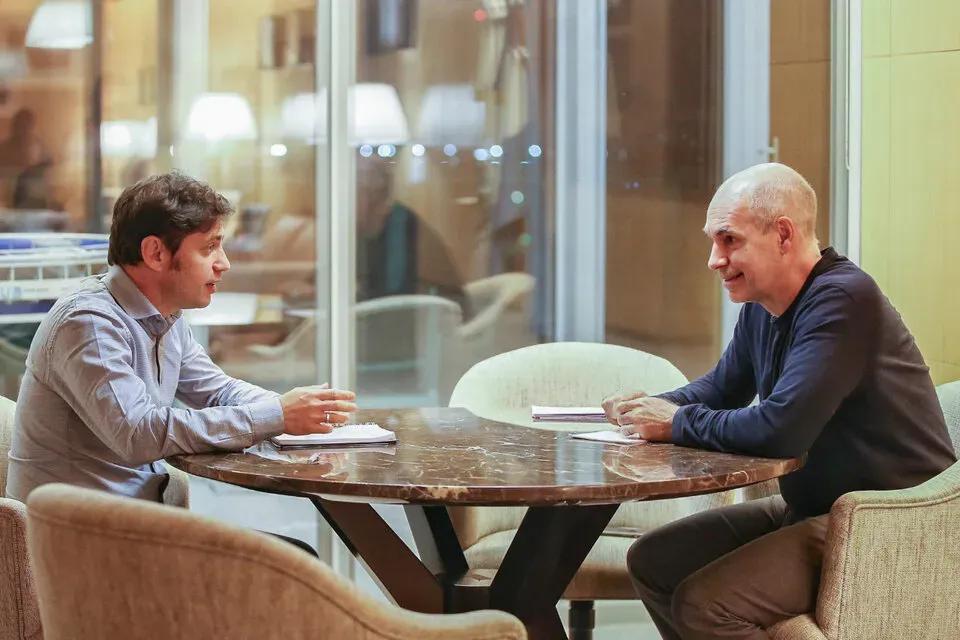Axel Kicillof and Horacio Rodriguez Larreta
Larreta in the rearview mirror.
The internal struggle of Peronism is now exposed in broad daylight. After the event in Berisso, where the governor, from a stage surrounded by figures of traditional Peronism from the Province of Buenos Aires, made a bow to former president Cristina Kirchner, while with a twist he called for the unity of Peronism to face Milei, the lack of a strong support for Cristina generated reactions from various actors in the hardest Kirchnerism. Oscar Parrilli, national senator and a close associate of the former president, stated: 'We are still waiting for an explicit statement from Kicillof'. Cristina herself, during a meeting at the Smata union, stated: 'The Pontius Pilates and the Judases in Peronism are no more'.
Governor Axel Kicillof faces a double challenge: to build a political space with its own identity —that is, to compose his “new songs,” in his own words— and, at the same time, to win over society from the opacity of a discourse that has more management than epic. This last challenge was already faced, in the recent past, by Horacio Rodríguez Larreta.
The year 2020 marked a turning point. Horacio Rodríguez Larreta, from the government of the City of Buenos Aires, faced numerous criticisms within his own party for having supported the quarantine measures. These criticisms manifested in marches against the restrictions, led by Patricia Bullrich, then Security Minister and his future rival in the Juntos por el Cambio primaries.
The differences were resolved during the 2021 electoral campaign, with the goal of achieving a decisive victory against Fernández's government. Once the victory was obtained, the differences intensified in the lead-up to the 2023 campaign, where Larreta again tried to promote his candidacy from the responsible management of the state, lacking any epic or ideological battle. His main focus was state management and technocracy.
Meanwhile, Bullrich proposed a total fight against Kirchnerism, from the logic of friend-enemy. The former Security Minister sought to exploit polarization through an epic of order and combat against all those who sought to break it. The campaign lacked a management that could support it, at least while it was underway. The campaign slogan made it very clear, both internally and externally: “Change is all or nothing”, a clear allusion to the indecisiveness of the head of the city government.

Source: 0221.com
The Peronist internal conflict:
It seems that, faced with a new scenario, similar to a game of musical chairs, Peronism finds itself in the same situation. It is no longer the pandemic that forces governments to act responsibly, but how to face an open policy of demolition of the state being carried out by the libertarian government.
Kicillof, just like Larreta, implements a strategy of brute-force work with little media participation and almost no ideological dispute. His management focuses solely on effective reality, establishing cordial links with various non-Peronist left political spaces. Recently, Carlos Bianco, Minister of Government, participated in the launch event of the Communist Party of the Province of Buenos Aires. It is clear that the governor seeks to confront Milei from a broader center-left space, which may include radicals if necessary.
Meanwhile, Cristina and Máximo Kirchner have a different diagnosis. According to them, the way to confront Milei should not be from breadth but rather from the concentration of a force that takes Peronism by storm, without the breadth or shared leadership that characterized the failed Frente de Todos. From an external place to the Justicialist Party, Guillermo Moreno reached the same conclusion. The direction should no longer be collegial, but unipersonal. "The one who wins leads, the one who loses follows."
The differences between the more orthodox Kirchnerism and Kicillof have been growing since the electoral campaign, especially when the governor introduced the concept of "new songs", which sparked outrage from Máximo Kirchner. Recently, Kicillof discreetly supported the candidacy of Ricardo Quintela, governor of La Rioja, to preside over the Justicialist Party (PJ), with the backing of other governors. However, Cristina Kirchner disrupted the harmony with her own candidacy, forcing Kicillof to decide whether to support her or the Riojano.
Kicillof responded moderately and without major definitions. He stated that, although "the happiest days were with Cristina," he was not interested in the internal affairs of the Justicialist Party (PJ) and that his call was for unity. For her part, Cristina Kirchner responded by presenting her own list with her at the head and compared the governor to Pontius Pilate. Additionally, she demanded that he publicly acknowledge that his officials were collecting endorsements for Ricardo Quintela.
An epic that comes from the office.
Revisiting the parallel with the political scenario of 2023, it is crucial that the Peronist internal struggle is not so destructive as to erode the political capital of both main actors, as this could leave them vulnerable to external actors seeking to influence from outside the traditional structure of Peronism. These actors exist and must be addressed; otherwise, Peronism may find itself with its own outsider. An actor who, in the absence of renewal, carries it out by storm.
In this context, Axel Kicillof positions himself as a key figure in the process of reconfiguring Peronism, seeking not only to redefine its future but also to confront internal divisions and the challenges posed by these new political actors. With the 2025 elections on the horizon, the tension between the need for firm unity to face common adversaries and internal disputes over leadership highlights a dynamic that could decide not only the future of Peronism but also the overall political course of Argentina. But for Axel Kicillof to effectively synthesize these tensions and offer an attractive vision, he must adapt to the times and current leadership expectations. This involves developing a future narrative that transcends the confines of a traditional, gray state office.

Comments